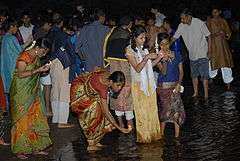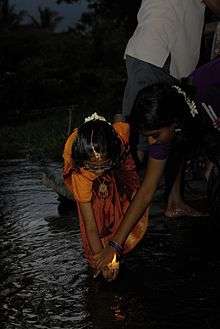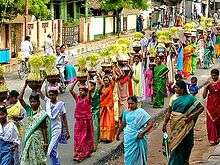Aadi Perukku
Aadi Perukku (![]()
| Aadi Perukku | |
|---|---|
 Aadi Monsoon Festival | |
| Also called | Aadi Perukku, Translation: Aadi Monsoon Festival, Pathinettam Perukku |
| Observed by | Tamils |
| Type | Religious |
| Observances | Prayers, Mulaipari, Religious rituals |
| Date | Decided by the Tamil calendar |
| 2019 date | 3 August |
| Frequency | annual |
Monsoon festivals of South India

Aadi Perukku is a unique South Indian and specially a Tamil festival celebrated on the 18th day of the Tamil month of Adi (mid July). The festival coincides with the annual freshes of the rivers and to pay tribute to water's life-sustaining properties. It is celebrated near river basins, water tanks, lakes and wells etc. of Tamil Nadu when the water level in the rises significantly heralding the onset of Monsoon. It is also famous among Sri Lankan Tamils. This is also celebrated by most of the Tamils around the world.
Aadi Perukku, water ritual through religious practice
In India the rivers Ganges and Yamuna, Cauvery and Godavari are considered sacred. Just like the earth gives us food, water is considered as a sacred necessity to meet the needs of individuals. People began to worship water in the form of wells, tanks and rivers. It is common among people to throw fruits, saffron cloths, etc., when the rivers and lakes are in spate purely based on the belief that these rivers are the species of female deities. Similarly every temple has sacred wells and tanks, and water in these resources are considered pure. There are cultural developments of the society that highlight many variations on the theme of primeval water which shows that water culture and civilization represent human interest with sacredness.
Aadi Perukku, otherwise called Padinettam Perukku is a unique occasion dedicated to the all the perennial river basins of Tamil Nadu and major lakes water source areas and is intended to celebrate the water rising levels due to the onset of monsoon, which is expected to occur invariably on the 18th day of the solar month, Aadi corresponding to 2 or 3 August every year. Hence "Padinettam perukku" - Padinettu signifies eighteen, and Perukku denotes rising. This festival is observed predominately by women in Tamil Nadu. The Adiperukku, as a water-ritual, celebrated by women is to honour nature.
The association of this ritual with fertility, sex and reproduction is both natural and human. This water ritual practice is performed on the banks of Rivers, which is described as a rice-cultivation tract. The history of this ritual practice dates back to the ancient period and was patronised by the Kings and royal households. This ritual practice existed in various historical periods. Aadi is the month for sowing, rooting, planting of seeds and vegetation since it is peak monsoon time when rain is showered in abundance.
Aadi Perukku festival in River basins and other water catchment areas
Apart from people flocking at the waterfalls sources of western ghats for premonsoon and monsoon festivals. People living on the banks of the river beds and other important water generation sources offer pujas to the water goddess and river god. For Aadi perukku every year so that when nurseries are raised in the fields subsequently and sustained north- east monsoon. The crop will be ready for harvest during Thai Pongal Celebration in 5 months duration.
According to the Tamil calendar, Aadi is the fourth month of the year. The first day of this month, usually falling on 16 July, is celebrated as Aadi Pandigai or Aadi Perukku, which is an important festival to most Tamils, especially newly-weds. The most visible manifestation of the month of Aadi is the huge 'kolams' that are painstakingly patterned early each morning in front of houses. They are usually bordered with red 'kaavi' and across the front doorway at the top are strung mango leaves. The first of the month is marked with a special puja, followed by a feast with 'payasam' prepared with coconut milk, 'puran poli' and vadai. Traditionally, the family of a 'pudhu maappillai' (new son-in-law) is invited to the girl's house, where the couple is gifted new clothes and other presents.
Aadi is a month of fervour and observances dedicated to the Goddesses related to water and other natural forces (e.g. Mariamman temples, Mundakanniamman temples etc.) where prayers and pujas are offered to propitiate the powerful goddess to seek their protection from the inauspicious aspects that are often associated with the month. No weddings or other similar functions are celebrated during Aadi. It is during this time that the monsoon peaks on the west coast and the rivers of Tamil Nadu, shrunken in the summer heat, get replenished, often to near full levels.
The 18th day of Aadi, usually 2 August, is observed as 'Aadi Perukku', a day of offerings and prayers to these rivers, which mean so much to the lives and prosperity of the people. The day is an occasion for rejoicing particularly for those living on the banks of the all the main rivers, its branches and tributaries. There is a belief that young girls who do this puja offering Kaadholai (earrings made of palm leaf), Karugamani (black beads) and Kaapparisi (a sweet made of hand pounded rice and jaggery) will be blessed with good husbands. The families spend the evening by the river, eating preparations of rice like puliyodharai, thengai sadam, elumichha sadam etc. Playing to the tune of Adiperukku folk songs and Kummi group by young women are the major attractions during this festival.
Mulaipari and Aadi Perukku

Mulaipari (Sprouting or Germination of Nine Grains or Navadhanyam in a basket or clay mud pots) is a very important ritual which takes place at almost every village Goddess celebration. In its most original form, it is an exclusively women's ritual and is of great importance for the whole village. The participants of the processions carry earthen pots with grown grains (nine different types of grains) inside on their heads and walk towards a river where the content is dissolved. The procession is accompanied by Amman. The ritual is very elaborate. Before the procession starts, special songs and dances ( Kummi Pattu, Kummi ) are performed. The original meaning of the ritual performance is a request to the village Goddess for rain and fertility of land, in order to secure a rich harvest. The women are involved in large groups significantly implying the fertility of women also ensuring continuation of human race with peace and harmony through empowered women.
All the year's major festivals are packed into the six months that follow, culminating with Thai Pongal in mid- January, giving meaning to the Tamil saying, Aadi Azhaikkum, Thai Thudaikkum
Cultural influence
In Amarar Kalki's legendary novel, Ponniyin Selvan, the story and protagonist are introduced on the banks of the Veeranarayana Yeri [Veeranaryanan Lake] on the day of Aadi Perukku. The hero of the book, Vandiyathevan is riding on a horse along the shores of the lake, enjoying the sights, the Aadi celebrations, and stopping to share the food with the villagers. The lake constructed in the South Arcot district during Chola Rule and was fed by the river Kollidam and its branch Vadavaru. You will be transported to that day and time when you read those lines. [1]
External links
